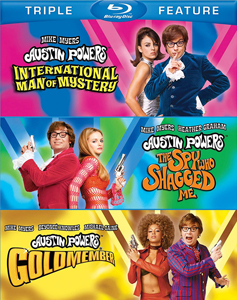Now that I have a grounding in James Bond tropes, I watched the “Austin Powers” trilogy (1997-2002), a tour de force of performances by Mike Myers with jokes that connect about half the time. At first blush, the timing for these films is 10 to 20 years too late, since they make fun of the classic “Bond” clichés at a time when people were loving the hip updates of the Pierce Brosnan films.
But at least the first entry, “Austin Powers: International Man of Mystery” (1997), achieves timelessness.
Contemporary sequels
“Austin Powers: The Spy Who Shagged Me” (1999) has more contemporary references that date it, including Dr. Evil’s (Myers) and Mini-Me’s (Verne Troyer) groan-worthy piano performances of “One Of Us” and “Just the Two of Us.” So does “Austin Powers in Goldmember” (2002), wherein Dr. Evil performs a rap number to get his fellow prison inmates to help break him out.

“Austin Powers: International Man of Mystery” (1997)
“Austin Powers: The Spy Who Shagged Me” (1999)
“Austin Powers in Goldmember” (2002)
Director: Jay Roach
Writer: Mike Myers (1), Michael McCullers (2, 3)
Stars: Mike Myers, Elizabeth Hurley, Michael York, Seth Green, Beyonce (3)
“The Spy Who Shagged Me” also taps into the distinctly 1999 “Star Wars” nostalgia that came from the release of “The Phantom Menace,” although even at the time the joke of calling Evil’s moon base a “Death Star” felt lazy.
“Goldmember” gets closer to the quality of the original, thanks in part to the funniest sequence of the saga. “Spy Who Shagged Me” had introduced the silhouette gag wherein Austin (Myers) is bent over a map in a tent while Felicity Shagwell (Heather Graham, at her 1999 Heather Grahamiest) rifles through a bag of gear behind him.
To the bad guys watching from outside the tent, it looks like she’s pulling items out of his butt.
That’s good stuff, but “Goldmember” ups the ante when Mini-Me is standing behind Austin and – from outside the doctor’s screen — his arm looks like it’s Austin’s penis. This sequence is so brilliantly staged that I was laughing out loud.
Back to the well
Since humor is subjective, people’s rankings of the three films could be in any order. A friend of mine finds Goldmember (Myers) peeling off pieces of skin and saving it in a box to be hilarious; I found it gross. Even some gags that recur in all three films miss the mark for me – a prime example being Dr. Evil’s henchwoman Frau Farbissina (Mindy Sterling) shouting out words.
The sequels fall a little short of the original because of these repeats. Evil’s ransom demand of “1 million dollars” (which he changes to “100 billion dollars” on his henchman’s suggestion) is iconic, but the sequels fail to land variations on the gag.

To the credit of writers Myers and Michael McCullers, though, the sequels feature original plots as they find more detailed elements of the “Bond” films to make fun of after the original tees up the obvious points.
Among the most obvious (although still a YouTube clip staple) is Dr. Evil’s overly elaborate manner of killing heroes Austin and Vanessa Kensington (Elizabeth Hurley), something his son Scott (Seth Green) calls him out on.
Parodying Blofeld
“Powers” is far from the first property to parody this trope; “The Simpsons” did it one year earlier. “Last Action Hero” did it four years earlier. And “Police Squad” parodied Dr. Evil inspiration Blofeld in 1982 – it has the cat talking instead of the villain.
The overly elaborate killing schemes – particularly as engineered by Blofeld in “Thunderball” – are so ingrained in comedy lore that “Spectre” (2015) found itself with the difficult task of buying the character back. In my opinion, it fails, merely giving us another instance of Blofeld sloppily letting Bond escape.
If November’s Daniel Craig “Bond” finale digs further into the brotherhood of Bond and Blofeld (Christoph Waltz), well, “Goldmember” has parodied that in advance: The film ends with heroes and villains (except the still annoyed Scott) merging as a happy family and Burt Bacharach performing “What the World Needs Now is Love.”
I bet this was a post-9/11 reaction; I recall that comedy films were looking for less crass ways to find laughs in 2002.
Memorable music
Speaking of music, the “Bond” theme has its roots in a musical, but it remarkably translated well to a manly adventure theme. Likewise, Quincy Jones’ “Soul Bossa Nova” (1962) fits perfectly as a number Austin and background dancers frolic to at the beginning of the movies. It parodies the “Bond” theme even though that wasn’t its original intent.
The “Powers” films view Classic James Bond as a man stuck in a bygone era, and the sequels introduce time travel, so we’re invited to compare 1967 with 1997, 1969 with 1999, and 1975 with 2002. “International Man of Mystery” makes Austin sympathetic; he has always seen the world as his playground and it takes him a while to realize 1997 is different.
Interestingly, the movie generally laments the loss of the free-love spirit of the Swingin’ Sixties. While it recognizes that behavioral changes had to be made with the revelation of STDs and drug-use side effects, we feel the loss of Austin’s groovy attitude where he loves everyone.
In 1997, he flashes a peace sign in a bar and gets laughed at by the “cool” people for looking silly. Those cool people would’ve been squares in Austin’s less judgmental day.
Capturing the past
The set decorators and costume designers beautifully capture those past eras, or at least the stereotypically colorful versions of it. Check out Austin’s happy-day montage with Felicity (my favorite of the Powers Girls even if “Spy” is the weakest film) through 1969 London, and the sexy performance by Foxxy Cleopatra (Beyonce) of a club medley in 1975.
But the sequels are less interested in commenting on social changes. And truth be told, all three films have their best luck with bathroom humor. “Man of Mystery” and “Goldmember” both boast a great gag built around Austin peeing, and in the original, Tom Arnold’s commentary amid the “Who does No. 2 work for?” scene is a restroom-stall classic.
Myers must’ve been exhausted at the end of each shoot. In addition to writing, he plays Austin, Dr. Evil, Fat Bastard and Goldmember. Even if I don’t find the latter two consistently uproarious, I admire the way he makes them distinct. (Also, the fat suit for Fat Bastard is an incredible, if disgusting, achievement.)
The “Powers” saga isn’t the smartest brand of parody ever concocted – it swings at a ball that’s teed up – but all three films have their moments (the first and last have LOL moments), and Myers’ dedication is never in doubt.
“Austin Powers: International Man of Mystery” (1997): 3.5 stars
“Austin Powers: The Spy Who Shagged Me” (1999): 3 stars
“Austin Powers in Goldmember” (2002): 3.5 stars

